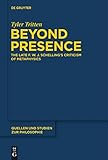Beyond Presence : The Late F.W.J. Schelling's Criticism of Metaphysics / Tyler Tritten.
Material type: TextSeries: Quellen und Studien zur Philosophie ; 111Publisher: Berlin ; Boston : De Gruyter, [2012]Copyright date: ©2012Description: 1 online resource (374 p.)Content type:
TextSeries: Quellen und Studien zur Philosophie ; 111Publisher: Berlin ; Boston : De Gruyter, [2012]Copyright date: ©2012Description: 1 online resource (374 p.)Content type: - 9781614512110
- 9781614511557
- 193 23
- B2898 .T75 2012eb
- online - DeGruyter
- Issued also in print.
| Item type | Current library | Call number | URL | Status | Notes | Barcode | |
|---|---|---|---|---|---|---|---|
 eBook
eBook
|
Biblioteca "Angelicum" Pont. Univ. S.Tommaso d'Aquino Nuvola online | online - DeGruyter (Browse shelf(Opens below)) | Online access | Not for loan (Accesso limitato) | Accesso per gli utenti autorizzati / Access for authorized users | (dgr)9781614511557 |
Browsing Biblioteca "Angelicum" Pont. Univ. S.Tommaso d'Aquino shelves, Shelving location: Nuvola online Close shelf browser (Hides shelf browser)

|

|

|

|

|

|

|
||
| online - DeGruyter Handbook of Second and Foreign Language Writing / | online - DeGruyter Semiotics of Classical Music : How Mozart, Brahms and Wagner Talk to Us / | online - DeGruyter The Syntax of Topic, Focus, and Contrast : An Interface-based Approach / | online - DeGruyter Beyond Presence : The Late F.W.J. Schelling's Criticism of Metaphysics / | online - DeGruyter Discourse and Grammar : From Sentence Types to Lexical Categories / | online - DeGruyter Religious Voices in Self-Narratives : Making Sense of Life in Times of Transition / | online - DeGruyter Wilderness in Mythology and Religion : Approaching Religious Spatialities, Cosmologies, and Ideas of Wild Nature / |
Frontmatter -- Acknowledgements -- Abbreviations Used in References and Notes on Translations -- Contents -- Part I. Crisis and Method -- Chapter 1. The Contemporary Crisis of Meaning -- Chapter 2. Positive Philosophy as Both Method and Object: A Methodological Analysis -- Part II. The Past: Eternity -- Chapter 3. Timelessness: The Potencies at Rest -- Chapter 4. The Time of Eternity: The Potencies in Act -- Chapter 5. Intermittence -- Part III. The Present: Historical Time -- Chapter 6. The Philosophy of Mythology -- Chapter 7. Language is Faded Mythology: On the Origin and Essence of Language -- Part IV. The Future: Advent -- Chapter 8. Intimations of the Future and Concluding Remarks -- Schema of the Doubled Temporal Relations of the Creation and Mythology with Reference to the Corresponding Gods and Peoples -- References -- Author Index -- Subject Index
restricted access online access with authorization star
http://purl.org/coar/access_right/c_16ec
This book provides the English-speaking world with a comprehensive account of the still largely unknown work of Schelling’s philosophy of mythology and revelation. Its achievement, however, is not archival but philosophical, elucidating the relation between Schelling and onto-theology. It explains how Schelling dealt with the problem of nihilism and onto-theology well before Nietzsche and Heidegger, arguing that Schelling surpasses onto-theology or the philosophy of presence a century prior to Heidegger. Overall, the author provocatively suggests that Heidegger is perhaps Schelling’s genuine heir and by comprehensively interpreting Schelling’s multifaceted late lectures he analyzes issues as diverse as the Ancient relation between thinking and Being, the Medieval debate between voluntarism and intellectualism, the overcoming of modern subjectivism and German Idealism as well as many themes in contemporary philosophy. The presentation is systematic rather than thematic, following Schelling’s ages of the world through the Past, Present and Future. The results are daring, departing from the half-century long canonical reading of the late Schelling since Walter Schulz. This book is valuable for Schelling-scholars, historians of philosophy and theologians alike.
Issued also in print.
Mode of access: Internet via World Wide Web.
In English.
Description based on online resource; title from PDF title page (publisher's Web site, viewed 28. Feb 2023)


